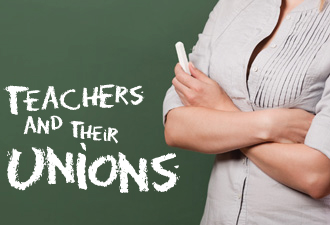Commentary

Teachers and Their Unions
Teacher unions like to say they represent their members and look out for their best interests, including protecting their rights to speak out without reprisal. Teachers are by the nature of their work college graduates. So it’s a bit more common for them to try to have their say than in many other occupations.
Let’s see how this works out.
Some years ago, Kevin Irvine was selected Colorado’s Teacher of the Year. The next year there was a voucher initiative on the ballot in his state and Kevin publicly endorsed it. The result? He was criticized and threatened by his union and some colleagues.
In another state a teacher appeared at a school board meeting and, during the period for public comments he objected to the district initiating a policy of payroll deductions of payments to the unions. The union not only disagreed with him, as might be expected, but they said he had no right to speak because the union was the exclusive bargaining agent. The issue went to court, all the way to the Supreme Court. Essentially, the Court concluded that the teacher was not trying to bargain but the union was trying to violate his constitutional right of free speech.
In one major city where the union contract specified the required school hours for teachers, a fairly common provision, the union criticized its own members who stayed in school longer than those hours, on their own and without extra pay. The union charged them with embarrassing their colleagues and engaging in the education equivalent of a speedup.
In that same city, the school district received millions of foundation dollars to help develop mini-teams in its large high schools whereby 4-5 teachers could work with 100 or so students. Some teachers requested that they be able to agree among themselves as to who would constitute such a team. The foundation had no problem with that. The school board had no problem. The administration had no problem. Ah, but the union did have a problem. It refused to let their members form their own teams. This is but one example of union hypocrisy about “teacher autonomy.”
In a separate instance in which I was personally involved, an ad hoc group of educators from basic and higher education, including union staffers, agreed to hear the views of the state’s recently announced Teacher of the Year. All of us but one. But we had a unanimity rule. The one objection came from a staffer of the union to which this teacher belonged (And of which I was president when this staffer was hired.). He said,. “If one of our teachers is going to speak to our group we’ll decide who it will be.” Ironically, the rival teacher union staffer had no problem.
Probably the most famous instance of this problem occurred with the late Jaime Escalante who was so successful teaching calculus to mostly poor and Latino students in Garfield High School in East Los Angeles. The movie “Stand and Deliver” was based on his story.
His sin? He had 70 or more students in some classes, more than triple the maximum permitted in the union contract. Jaime said he would not deny admission to his classes for any student who wanted in. Union representatives helped persuade teachers to vote him out as math department chairman. Jaime naively wrote to his union president, saying “If you looked into what is going on in this school in the name of the union, I think you…would be appalled.” Wrong!
Even after he was removed as department chairman the harassment continued, causing him to leave the district. He quickly was hired elsewhere. So he wasn’t hurt professionally but Garfield’s students lost access to one of the best math teachers in the nation. Jaime said he had “thought the union was going to focus on how to improve our skills. But they’re more interested in politics than kids.”
On that, he seems to be right, at least at Garfield..
Anything here pro-teacher? Or pro-student?
# # #
David W. Kirkpatrick, a Senior Fellow with the Commonwealth Foundation (www.CommonwealthFoundation.org), is a retired public school teacher and former president of the Pennsylvania State Education Association labor union.